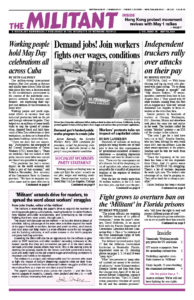FONTANA, Calif. — With horns blasting and big rig truck cabs plastered with signs saying, “No to cheap freight,” “Enough is enough!” and “Stop abusive brokers,” 50 owner-operators convoyed from here to Los Angeles May 1. They joined with 60 other truckers coming from the Port of Los Angeles in a “slow roll” around downtown Los Angeles to focus attention on the crisis they face.
Similar protests by hundreds of truckers in Chicago, Washington, D.C., Houston, Miami and elsewhere took place the same day and earlier in the week. The truckers called the actions “Mayday” protests — an SOS call for changes in the industry.
“The rates I get for a load have been cut in half,” Rogelio Sanchez, who has been driving his own truck since 1995, told the Militant, Like the other owner-operators at the protest, Sanchez said he bids for work from freight brokers.
“Since the beginning of the year there has been a lot less shipments from China. And it’s gotten worse since the COVID-19. I’m struggling. There’s a lot of truckers desperate for work right now. The brokers take advantage of us, they’re gouging us. They sell us loads for as cheap as possible.”
Carlos Orellana has been a trucker for 12 years and got his own rig eight years ago. “I used to get over $1,400 flat rate to take a load from Los Angeles to Phoenix,” he explained. “Now the brokers offer $700.” Out of that money comes truck payments, cargo and insurance, fuel, maintenance and other overhead expenses. That leaves drivers like Orellana little or nothing at the end.
Marvin Romero from Hesperia said, “Every time I have to go on the road I call a broker for a load. From Los Angeles to Houston they offer $1,900. That’s about $1 a mile. I would barely break even. We’re demanding a fair price. I love driving,” he said. “We just want respect. We’re forced to bid against each other, fighting against each other.”
Birkeran Singh, originally from Punjabi, India, has been a trucker for five years, since he was 19 years old. “I haven’t worked for over a month because the pay is no good. I can’t break even,” he said. “Some truckers are working negative, going in the hole after all their expenses just to be able to drive.”
Another common complaint is about the Electronic Logging Device. It is installed in each truck as a result of a federal mandate that regulates the hours each driver can operate the vehicle.
“It’s made the situation go from bad to worse,” Victor Castro said. “The computer tells you what you can and can’t do. You’re forced to drive for a longer time because the computer is pushing you.”
Sanchez said that “last week a convoy of 60 trucks was swarmed by the California Highway Patrol.” Many got $200 tickets for allegedly blocking traffic while trying to keep the caravan together. Scores of Highway Patrol cars were stationed all along the route to and from Los Angeles May 1.
Supporters of the Socialist Workers Party joined the caravan with signs saying, “Guarantee truckers cost of operation, including living expenses” and “Build hospitals, housing, schools. For a massive public works program at union wages.”
The party’s participation was welcomed. Six truckers and family members got subscriptions to the Militant. “This is good you’re covering what is happening around the world,” Cynthia Gonzalez from Victorville said after she looked through the paper. She has been trucking together with her husband, Victor, for 12 years.
“We need to know what is going on elsewhere,” she said. “The news doesn’t inform us of what is happening, it doesn’t know what the truckers and their families are going through. If not for the truckers, we wouldn’t have anything, no food, no toilet paper, everything we wear on our backs.”
Josefina Otero contributed to this article.
?
WASHINGTON — More than 70 truckers protesting low freight rates and rapacious brokers’ fees have been parked on the Mall at the U.S. Capitol since May 1. They say they want to meet with President Donald Trump to discuss relief they desperately need.
“This crisis is pushing us together. We have to educate ourselves. Demands for more government regulation of the industry won’t solve it,” owner-driver Mike Landis from Lititz, Pennsylvania, told the Militant May 2. Landis, who has 16 years trucking, is an organizer for U.S. Transportation Alliance, which fights for safety. “Better to decide that we are not going to haul freight for less than a certain rate per mile.”
After 12 years as a union coal miner near Beckley, West Virginia, Adam Gentry became a trucker. “Here we are again,” he said. This was the second time Gentry faced depression conditions because of a crisis in the industry he works in. “What makes matters worse is the way we are treated. When we arrive with a load, we have to call on the phone and sit in our trucks. No bathrooms for us, no facilities.”
Detention — the name of the punishment many of us remember from high school — is the industry term to describe the time truckers have to sit and wait for a load.
“We have to wait for two to three days to pick up a load. You can put in your detention time with the broker, but you don’t always get repaid,” Gentry said. “On top of that there’s lumper fees at the other end. The grocery warehouses are the worst, asking $500 to unload the truck. That’s like asking your mailman to pay you for delivering your mail.”
“We have no choice but to be here,” Pavlo Udud, 25, said. He had come with 13 other Ukrainian-American truckers from Cleveland to take part in his first protest.
“It took this crisis to get guys to come together,” Kris Young, who came to the protest with her husband, Scott Obermiller, told the Militant May 3. They have a rig and a trailer they bought secondhand. She said she was happy with the strong turnout.
Young pointed to the diverse range of truckers there. “We have Black, white, Spanish, the trucker up the street, I don’t know what country he’s from, but he brought in food for everybody,” she said. “We have all kinds of nationalities, all kinds of religions.”
She said the whole setup is rigged against the truckers. “We’re overregulated as it is, we don’t need regulation, and if there’s more, they’ll just regulate how much we can get,” she said. “We don’t want a bailout from the government. We just want stuff fixed.”
Tony Lane from Pittsburgh contributed to this article.

